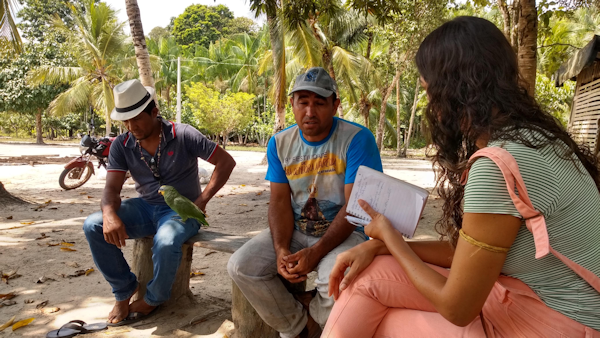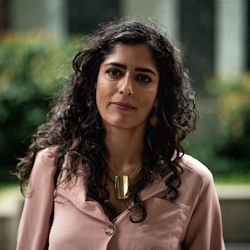SEJournal Online is the digital news magazine of the Society of Environmental Journalists. Learn more about SEJournal Online, including submission, subscription and advertising information.
 |
 |
| Author Mendes, in the field (at right), reporting for her award-winning story. Photo: Mongabay. |
Inside Story: High-Risk Reporting Yields Results on Palm Oil Investigation
Reporter Karla Mendes took significant personal risks to investigate the devastating impact of the palm oil industry on an Indigenous community in the Amazon, highlighting both the personal suffering and the environmental damage it causes. Her resulting coverage won her second place in the Kevin Carmody Award for Outstanding Investigative Reporting, Small category, in the Society of Environmental Journalists' 21st Annual Awards for Reporting on the Environment. Judges praised Mendes for bringing international attention to the issue and creating real impact through her storytelling.
SEJournal Online recently caught up with Mendes by email. Here is the conversation, edited for clarity.
SEJournal: How did you get your winning story idea?
 |
Karla Mendes: I first started investigating environmental crimes linked to palm oil companies in the Brazilian Amazon when a source reached out to me with serious land-grabbing claims against palm oil producers. As the palm oil industry is highly underreported in Brazil, I immediately dived into in-depth investigations and traveled to northern Pará state, which accounts for about 90% of the country's palm oil production.
While talking to a state prosecutor in the capital Belém, I raised several questions related to the effects of the palm oil industry on Indigenous peoples and Quilombolas — Afro-Brazilian descendants of runaway slaves — and I found out that beyond land issues there were also water pollution claims related to palm oil companies. Soon after, I traveled to Indigenous and Quilombola communities and stumbled onto very serious issues that I reported in this investigation.
SEJournal: What was the biggest challenge in reporting the pieces and how did you solve that challenge?
Mendes: The biggest challenge was to wrap up the material, as the range of allegations against palm oil companies was enormous. And the claims kept arriving until the very end of the deadline. But at the same time, they made the investigation even stronger as there were scientific studies showing strong evidence of water contamination in the areas I visited. Another challenge was to get responses from the government of Pará to the story.
‘My reporting team and I barely evaded
a high-speed robbery, when we were
pursued by men on two motorbikes.’
Also during the reporting trip, my reporting team and I barely evaded a high-speed robbery, when we were pursued by men on two motorbikes while returning from the Turé-Mariquita Indigenous territory. On this same path, Indigenous chief Lúcio Tembé was shot in the head in May 2023 and “miraculously” survived.
I also shared a horrible first-hand experience I had myself with the toxic effects of the chemical sprays that palm oil company Brasil BioFuels reportedly used on its plantation and that drifted onto me while reporting the story. I documented a horrible coughing fit from that experience for my behind-the-scenes video report, and it sobered me greatly about the chemicals’ toxicity.
SEJournal: What most surprised you about your findings?
Mendes: I was astonished when I learned that federal prosecutors had been battling for seven years to get a court decision to carry out a forensic investigation into palm oil contamination in Pará; they were appealing to a higher court, as lower courts denied the request due to “lack of danger” to the local communities. After going to the field, I witnessed the risks and side effects the local communities were facing due to water contamination linked to palm oil plantations.
I was also very surprised when I found scientific studies with evidence of water contamination in Indigenous lands from pesticides used by palm oil plantations that were never covered by news articles.
SEJournal: How did you decide to tell the story and why?
Mendes: Given the bulk of information collected and the complexity of the case, the best approach to tell this story was to put together a unique long-form investigative piece instead of a series, along with multimedia elements, including video, maps, charts and photos. The goal was beyond revealing wrongdoing tied to the Amazon "sustainable" palm oil supply chain. The investigation was also somehow explanatory of the palm oil industry in Brazil, which was a very important aspect amid this underreported topic.
SEJournal: Does the issue covered in your story have disproportional impact on people of low income, or people with a particular ethnic or racial background? What efforts, if any, did you make to include perspectives of people who may feel that journalists have left them out of public conversation over the years?
‘Indigenous peoples and Quilombolas
were the key communities affected
by water contamination derived from
pesticides used in the palm oil industry.’
Mendes: Indigenous peoples and Quilombolas were the key communities affected by water contamination derived from pesticides used in the palm oil industry. I made a huge effort to tell the story from their perspective, showing all the impacts of the arrival of palm oil companies to the region. I highlighted how it substantially changed their livelihoods overall, including hampering them from drinking from or bathing in local rivers, which is a very strong trait of their culture. I also showed other related effects, including how game — which is also key to their traditional livelihood — became scarce, and then expanded the effects to the daily lives of people living in the wider Pará community: a school, for example, which was surrounded by palm trees and crops invaded by butterfly infestations.
SEJournal: What would you do differently now, if anything, in reporting or telling the story?
Mendes: I would have used a GPS to show all of our journey, as I believe showing all the places we visited on a map would be an interesting interactive feature in the story.
SEJournal: What lessons have you learned from your project?
Mendes: The main lesson was the urgent need to investigate the environmental impacts of plantations, after learning a wide range of absurdities related to the environmental license processing for crops in Brazil. That includes how loose the regulation is for any type of plantation, as there is a myth spread that it's not harmful because they're planting something, which is not true at all.
SEJournal: What practical advice would you give to other reporters pursuing similar projects, including any specific techniques or tools you used and could tell us more about?
‘It's key to identify all players and
affected communities by supply chains,
in order to reveal an accurate picture
of the wrongdoing in question.’
Mendes: It's key to identify all players and affected communities by supply chains, in order to reveal an accurate picture of the wrongdoing in question. It's also extremely important to search academic studies related to the matter, as a lot of unique research is simply buried in the universities. Also, all investigations must go through a legal review to avoid any flaws that could make the reporter a target of the accused company.
SEJournal: Could you characterize the resources that went into producing your prize-winning reporting (estimated costs, i.e., legal, travel or other; or estimated hours spent by the team to produce)? Did you receive any grants or fellowships to support it?
Mendes: I estimate the cost of this 18-month investigation as a minimum of $15,000, including two trips to Pará state, payment of drivers, fixers, videographer and legal review, among others. It also demanded a substantial number of hours spent by the Mongabay team, including editors, copy editors, layout editors, video editors, etc., which is priceless. This investigation was fully funded by Mongabay, without any grant or fellowship — I'm a staff reporter.
SEJournal: Is there anything else you would like to share about this story or environmental journalism that wasn’t captured above?
Mendes: It's key to share the impact of this investigation, showing that all the efforts paid back. Last year, my 18-month investigation of palm oil contamination in Pará helped federal prosecutors obtain a court decision to scrutinize the environmental impacts of pesticide use in oil palm plantations on Indigenous communities and the environment in the state.
My findings were seized on by federal prosecutors as evidence to hold palm oil companies accountable for water contamination in Pará state soon after the publication and, in October 2022, it helped federal prosecutors obtain a court decision to scrutinize the environmental impacts of pesticide use in oil palm plantations and to seek justice for the local communities. This is highly important because federal prosecutors had already filed suit about this issue, asking for a forensic investigation into pesticide contamination by the company but that suit had been dismissed for seven years.
Karla Mendes is an award-winning Brazilian journalist working as a Rio de Janeiro-based investigative and feature reporter for Mongabay and a fellow of the Pulitzer Center on Crisis Reporting Rainforest Investigations Network. She recently joined the board of directors of the Society of Environmental Journalists. She has been working as a correspondent for international outlets since 2015 and she specialized in covering environmental, land and property rights issues since 2017. Prior to that, Karla was a business reporter for over 10 years. She has a master's in investigative and data journalism from the University of King’s College and an MBA in finance from São Paulo’s Fundação Instituto de Administração.
* From the weekly news magazine SEJournal Online, Vol. 8, No. 39. Content from each new issue of SEJournal Online is available to the public via the SEJournal Online main page. Subscribe to the e-newsletter here. And see past issues of the SEJournal archived here.











 Advertisement
Advertisement 



